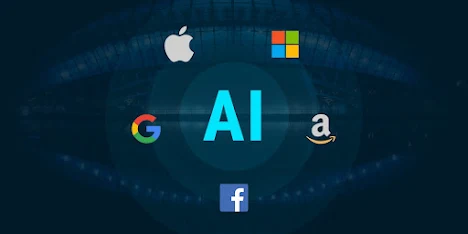How Different is the Work of Google, Facebook, Apple, and Amazon in AI?
Who is Going to Win the AI Race?
Artificial Intelligence (AI) is transforming industries, enhancing everyday technology, and shaping the future. The "Big Four" tech giants—Google, Facebook, Apple, and Amazon—are at the forefront of this revolution, each contributing uniquely to the development of AI. However, their approaches, strengths, and focus areas differ significantly, making the AI landscape both competitive and collaborative. This article explores the distinct strategies of these tech giants and analyzes who might emerge as the leader in the AI race.
You must see: Keeping Your Phone Safe From Hackers Tips and Tricks
Google's Mastery in AI Research and Innovation
Google, a subsidiary of Alphabet Inc., is a dominant force in AI, driven by its commitment to cutting-edge research and innovation. The company's AI efforts are spearheaded by Google AI and its dedicated research division, DeepMind.
Google's AI Ecosystem
- TensorFlow: Google’s TensorFlow is one of the most popular open-source frameworks for machine learning. It supports a wide range of AI applications, from simple models to complex neural networks, making it a critical tool for developers and researchers globally.
- AI Research: Google’s research spans natural language processing (NLP), computer vision, reinforcement learning, and more. Their achievements include the creation of BERT (Bidirectional Encoder Representations from Transformers), which has set new standards in NLP, and AlphaGo, which outperformed human champions in the game of Go.
- Cloud AI: Google Cloud offers a suite of AI tools and services, such as AutoML, which simplifies the process of creating custom machine learning models, and Google Cloud AI, which provides robust APIs for speech, vision, and translation.
Key Innovations and Applications
- Google Assistant: Leveraging Google’s expertise in NLP and speech recognition, Google Assistant provides a highly intuitive and intelligent virtual assistant experience.
- AI in Search and Advertising: Google uses AI to enhance its core products, including search algorithms and advertising platforms, improving user experience and targeting accuracy.
Challenges
Despite its strengths, Google faces challenges in enterprise adoption and ecosystem integration. Its enterprise AI solutions lag behind competitors like Microsoft in market penetration, and there's a need to strengthen its support for mission-critical applications.
You must see: Keeping Your Phone Safe From Hackers Tips and Tricks
Facebook's Commitment to Open-Source AI Development
Facebook, now rebranded as Meta, focuses on open-source development and AI democratization. Their AI initiatives are designed to enhance user experience and drive the development of the metaverse.
Facebook's AI Frameworks and Tools
- PyTorch: Facebook’s PyTorch has become a leading open-source machine learning library, favored by researchers and developers for its ease of use and flexibility.
- FAIR (Facebook AI Research): FAIR conducts advanced AI research in areas such as computer vision, NLP, and deep learning. Their contributions to self-supervised learning and neural networks have pushed the boundaries of AI research.
Innovations and Key Areas
- AI for Social Media: Facebook utilizes AI to enhance content recommendations, moderate content, and improve user interactions on its platforms, including Facebook, Instagram, and WhatsApp.
- Metaverse Development: AI is integral to Facebook’s vision for the metaverse, enhancing virtual environments through augmented reality (AR) and virtual reality (VR) technologies.
Challenges
Facebook’s focus on open-source projects means it lacks a strong AI services market presence. While its tools are widely used, the company does not compete as aggressively in providing enterprise AI solutions or cloud services.
You must see: Keeping Your Phone Safe From Hackers Tips and Tricks
Apple's AI Integration and Privacy Focus
Apple's approach to AI is characterized by seamless integration with its hardware and a strong emphasis on user privacy. Apple’s AI efforts are primarily directed towards enhancing user experience across its ecosystem.
Apple's AI Initiatives
- Core ML: Core ML is Apple’s machine learning framework that allows developers to integrate machine learning models into iOS apps with ease. It supports a variety of models and is optimized for performance on Apple devices.
- Siri and On-Device AI: Siri, Apple’s virtual assistant, leverages on-device AI to provide quick and personalized responses. This approach enhances user privacy by minimizing data sent to the cloud.
- AI in Hardware: Apple integrates AI in its hardware, including the A-series and M-series chips, which feature dedicated neural engines to accelerate AI processing.
Innovations
- Personalized User Experience: Apple uses AI to enhance the functionality of its devices, from improving photo quality with computational photography to providing intelligent suggestions in apps like Messages and Maps.
- Health and Fitness: AI powers features in Apple’s Health app, including activity tracking and personalized fitness recommendations.
Challenges
Apple’s AI development is less transparent compared to its competitors. The company does not publish as much research or engage with the broader AI community, making it difficult to gauge the full extent of its advancements. Additionally, Siri has been criticized for lagging behind other virtual assistants in terms of functionality.
Amazon's Leadership in AI Services and Cloud Computing
Amazon, through Amazon Web Services (AWS), has established itself as a leader in AI services and cloud computing. AWS provides a comprehensive suite of tools and services that cater to a wide range of AI needs.
Amazon's AI Offerings
- AWS AI and ML Services: AWS offers a variety of AI and machine learning services, including SageMaker, which allows developers to build, train, and deploy machine learning models, and Rekognition, which provides image and video analysis capabilities.
- Alexa and Voice Services: Alexa, Amazon’s virtual assistant, showcases the company’s expertise in NLP and voice recognition. Alexa is integrated into a variety of Amazon’s products, such as Echo devices, and is used by millions of customers globally.
Innovations
- Retail and Logistics: Amazon uses AI to optimize its retail operations, from demand forecasting and inventory management to personalized recommendations and logistics.
- Customer Experience: AI enhances customer interactions through personalized recommendations, voice-activated shopping, and efficient customer service solutions.
Challenges
Amazon’s AI efforts are heavily tied to its cloud infrastructure, which could limit its flexibility in areas outside of cloud-based AI solutions. Additionally, while Alexa is a market leader, it faces increasing competition from Google Assistant and Apple's Siri.
Who Will Win the AI Race?
The AI race is a complex and dynamic contest with no clear winner yet. Google excels in AI research and tools, positioning it as a leader in innovation and development. Facebook dominates in open-source contributions and the social media domain, while Apple integrates AI seamlessly into its ecosystem, emphasizing privacy and user experience. Amazon leads in AI services and cloud computing, leveraging its extensive infrastructure and retail expertise.
Ultimately, the "winner" of the AI race may not be a single entity but a collective advancement driven by the unique contributions of each of these tech giants. Their diverse approaches and innovations are pushing the boundaries of AI, making it an exciting and rapidly evolving field.





.jpeg)





.jpg)





0 Comments